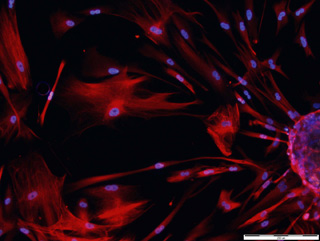
Induced pluripotent stem cells (iPS cells) are embryonic stem cells that can be derived from human skin cells. These iPS cells can then develop into different cell types. Image shows neural progenitors cells differentiated from human iPS cells. Red indicates a protein found in neural progenitors cells but not in pluripotent or skin cells. Blue indicates cell nuclei. Learn more about reprogramming in the Week 5 Lecture Summaries and Readings, and about neural differentiation in Week 6 Lecture Summaries and Readings. Image by Malkiel Cohen, used with permission.
Instructor(s)
Dr. Malkiel Cohen
Dr. Katherine Wert
MIT Course Number
7.342
As Taught In
Spring 2015
Level
Undergraduate
Course Description
Course Features
Course Description
One of the major priorities in biomedical research is understanding the molecular events that establish the complex processes involved in human development and the relationships of these processes to human disease and disease progression. In this class, we will explore stem cell biology and the way in which it has developed and shaped our ability to study complex human disease. We will introduce the field of stem cell biology and genome engineering through critical reading of both the classical and newest primary research literature. In addition, this course will discuss specific disease model systems and their benefits / limitations for understanding the disease and treating human patients.
This course is one of many Advanced Undergraduate Seminars offered by the Biology Department at MIT. These seminars are tailored for students with an interest in using primary research literature to discuss and learn about current biological research in a highly interactive setting. Many instructors of the Advanced Undergraduate Seminars are postdoctoral scientists with a strong interest in teaching.


